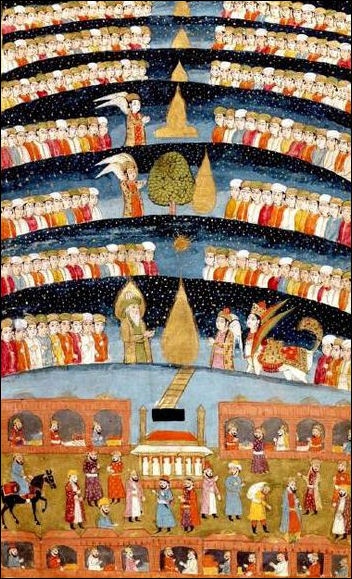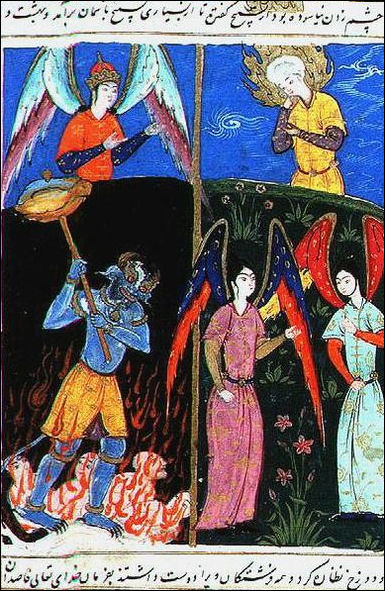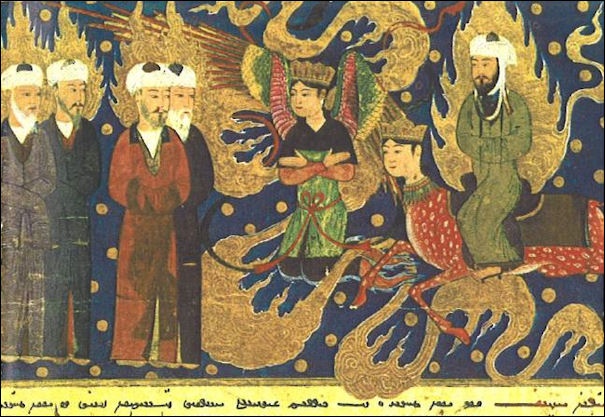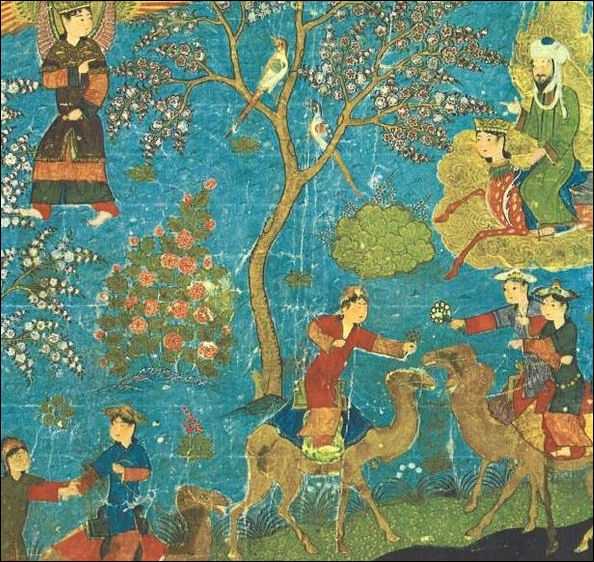MUSLIM HEAVEN AND HELL

Seven Paradises
In the Qur’an the universe is comprised of three realms—heaven, earth, and hell—in which there are two types of beings: humans and spirits. All beings are expected to obey God. Spirits include angels, jinn, and devils. Angels are created from light, are immortal and sexless. Jinn are beings created by fire that occupy a position between angels and humans and can be either good or bad. [Source: John L. Esposito “Worldmark Encyclopedia of Religious Practices”, 2000s, Encyclopedia.com]
Hazrat Mirza Tahir Ahmad wrote: ““In Islam itself there are different views held by different sects or Muslim scholars. The general understanding tends to perceive the otherworldly form as very similar to the carnal one here on earth. The concept of Heaven and Hell consequently present a material image rather than a spiritual image of things to be. Heaven is presented, according to their concept, as an immeasurably large garden literally abounding in beautiful trees casting eternal shadows under which rivers will flow. The rivers would be of milk and honey. The garden will be fruit bearing and all man may desire of fruits would be his at his command. The meat would be that of birds of all sorts; it is only for one to wish which meat he particularly craves. [Source: Hazrat Mirza Tahir Ahmad (1928–2003), Khalifatul Masih IV]
Female companions of exceeding beauty and refinement would be provided to the pious men, with no limit imposed on the number, which will be decided according to their capacity. As many as they can cope with will be theirs. What would they do? How would they relate with each other? Will they bear children or lead a barren life of enjoyment? These are all the moot questions. The enjoyment, as it is conceived, is intensely sensual. No work to be performed, no labour to be wasted, no effort to be made. A perfect life (if such life can be called perfect) of complete and total indolence, with the option of overeating and over-drinking, because also wine will be flowing close to the rivers of milk and honey. No fear of dyspepsia or intoxication! Reclining on heavenly cushions of silk and brocade, they will while their time away in eternal bliss—but what an eternal bliss!
“In Islam, there are others who categorically reject this naive understanding of the Quranic references to Heaven, and prove with many a reference to verses of the Holy Quran that what it describes is just metaphorical imagery which has no carnality about it. In fact the Holy Quran makes it amply clear that the form of existence of the life to come will be so different from all known forms of life here on earth, that it is beyond human imagination even to have the slightest glimpse of the otherworldly realities. “We will raise you into a form of which you have not the slightest knowledge.” (Quran 56:62)
“There are certain aspects of the new life which need to be discussed. The concept of hell and heaven in Islam is completely different from the normally held view. Hell and heaven are not two different places occupying separate time and space. According to the Holy Quran, the heaven covers the entire universe. ‘Where would be hell then?’ enquired some of the companions of the Holy Prophet(sa). ‘At the same place’, was the answer, ‘but you do not have the faculty to understand their coexistence.’ That is to say in ordinary human terms, they may seem to occupy the same time-space, but in reality because they belong to different dimensions, so they will coexist without interfering and inter-relating with each other.
RECOMMENDED BOOKS:
“The Garden and the Fire: Heaven and Hell in Islamic Culture” by Nerina Rustomji Amazon.com ;
“A Concise Description of Jannah & Jahannam: The Garden of Paradise and the Fire of Hell”
by Shaikh 'Abd Al-Qadir Al-Jilani Amazon.com ;
“Judgement Day: Deeds That Light the Way” by Omar Suleiman Amazon.com ;
“The Islamic Understanding of Death and Resurrection” by Jane Idelman Smith and Yvonne Yazbeck Haddad Amazon.com ;
“Al-Ghazali on the Remembrance of Death & the Afterlife” by Abu Hamid Al-Ghazali and T J Winter Amazon.com ;
“Muhammad's Grave: Death Rites and the Making of Islamic Society” by Leor Halevi Amazon.com ;
“Islam Beliefs and Teachings” by Ghulam Sarwar Amazon.com ;
“The Oxford Handbook of Islamic Theology” by Sabine Schmidtke Amazon.com ;
“The Cambridge Companion to Classical Islamic Theology by Tim Winter Amazon.com ;
“Unveiling Islam: An Insider's Look at Muslim Life and Beliefs” by Ergun Caner and Emir Fethi Caner Amazon.com ;
“Islam Explained: A Short Introduction to History, Teachings, and Culture” by Ahmad Rashid Salim Amazon.com ;
“No God but God” by Reza Aslan Amazon.com ;
“Welcome to Islam: A Step-by-Step Guide for New Muslims” by Mustafa Umar Amazon.com
Muslim Judgement and the Journey to Heaven and Hell

Idris the prophet in heaven and hell One by one people will be called before God to view the record of their life in the great Book of Life, a tablet attached to the throne of God. Each page has deeds from a person’s life recorded by the angels. Those destined for heaven are told to take their book in their right hand. Those condemned to hell must take it their left hand. After this they are asked to stand on scales operated by the archangels Jibril and Mikhail that weigh a person’s deeds and submission to Allah.
All souls cross the bridge of Shirat over Hell. The faithful, led by Muhammad and the other prophets, find that the bridge is wide and clear. Sinner find the bridge narrow and full of obstacles. The way for them is unmarked and no one is present to guide them. Even the most adept fall off when the bridge narrows to the width of hair and then an edge as sharp as a sword.
Sinners deemed unworthy of entrance to heaven fall in. They keep falling until they reach their appropriate level of hell (See Hell Below). Those that reach the other side of the bridge enter a desert with magnificent trees and begin their journey into heaven.
According to a 10th century description of the entrance to paradise: “Beneath each tree are two wells of water, which gush forth from the Garden...[The Saved] go to that desert and drink from one of the streams. When the water reaches their chests, all the foul matter and blood and urine depart, and they are cleansed of their outer and inner malevolence. Then they come to the other stream and wash their heads in it and their faces become as bright as the moon on the night of the full moon. Their souls become soft like milk and their bodies become sweet like musk.”
On the subject of entering paradise Muhammad said: "Hell is veiled in delights, and Heaven in hardships and miseries ...Paradise is nearer you than the thongs of your sandals; and the Fire likewise." He also said "he will not enter hell, who hath faith equal to mustard seed in his heart; and he will not enter Paradise, who hath a single grain of pride, equal to a mustard seed in his heart."
Muslim Heaven and Paradise
Islam has a concept of heaven and hell similar to that of Christianity and Judaism and has its roots in Zoroastrianism. Heaven is usually referred to as "paradise," or the “Gardens of Delight,” a place of physical and spiritual pleasure, where all of one's wishes and desires are fulfilled. The word "paradise" comes from the Persian word “ pairidaeza” .
Muslim heaven has seven tiers and a hierarchy of angels and appears to be a vison of paradise created by people who endured a hard life in the desert. It is described as a fertile oasis filled with water and fountains, palm trees, upholstered couches, air that smells of perfume, pomegranates two kinds of every fruit, “green, green pastures, and wonderful music.”
There is no description of a hierarchy in heaven in the Qur’an other than an ambiguous reference to “seven paths.”The concept of a seven-tired heaven arose after Muhammad’s death, and has it origins in ancient Mesopotamia and is believed to have been influenced by early Christian concepts of heaven.
Heaven also appears to be a place where the faithful can enjoy pleasures denied them on earth. According to one 11th century text: “On Sunday the [residents of heaven] will drink its honey...On Tuesday they will drink its wine. When they have drunk, they will become intoxicated: when they become intoxicated they will fly for a thousand years until the reach great mountains of fine musk.”
Qur’an on Heaven
In its description of paradise the Qur’an says: "No soul knoweth that is kept hid from them — of joy as a reward for what they used to do...God promiseth to believers, men and women, gardens underth which rivulets flow, wherein they will abide — blessed dwellings in Garden of Eden — and the pleasure of God is grander still; that is the supreme triumph."
"What is Paradise?" a man asked Muhammad. The Prophet replied "It is what the eyes hath not seen, nor the ear heard, nor ever flashed across the mind of man...When the people meriting Paradise have entered it, God will tell them: 'Ask Me what else I add to you? People will wonder having been honored, given Paradise and saved from Hell, and will not know what else to ask for. Thereupon God will remove the veil, and nothing would lovelier than gazing at the Lord."

Mohammad meets the Prophets
When Muhammad finished his description of Paradise Bedouin asked him, "Will there be camels also?" The Prophet smiled and said "There will everything that one would desire." Things that were forbidden on earth will be found in abundance in Paradise?"young and beautiful girls, carpets, luxurious garments, pearls, precious stones, fruits, wine, and all that men would desire."
Seven Gardens of Muslim Heaven
According to an 11th century text: “There are seven gardens. The first of them is the abode of majesty and it is of white pearl. The second is the abode of peace and it is of red sapphire. The third is the garden of refuge and it is of green chrysolite. The forth of them is the garden of eternity and it is of yellow coral. The fifth is the garden of bliss and it is of white silver. The sixth is the garden of paradise and it is red gold. And the seventh is the gardens of Eden and is of white pearl. This is the capital of the Garden and it is elevated over all the gardens.”
Each level of heaven has its own elaborate gate and appears to be reserved for a different class of faithful. Such as those who made the Hajj and gave alms to the poor. Only the those deemed as deserving advance to the higher levels. The top is reserved for saints and martyrs. Within each level are banners with the names of virtues and saints on them. Many of the trees are made of gold and silver. Some are decorated with horses and fine clothes and have roots made pearl. There are also a great man songbirds and magical animals.
The inhabitants are perpetually youthful and fresh. Men are beardless and have green mustaches (green being the auspicious color of Islam). Armpit hair and pubic hair will disappear and inhabitants will have 70 sets of clothes to wear. Food is plentiful and comes in a wonderful variety. If you want a game bird all you have to do is snap your fingers and it will land on platter and be roasted in front of your eyes. People can eat a hundred times what they ate on earth and never get fat.
Islam, Heaven, Martyrs and Virgins
The paradise with — 72 dark-eyed virgins — and guaranteed places for 70 relatives is for martyrs not ordinary Muslims. On the pleasures waiting for martyrs in paradise, the Qur’an reads:
“Spend eternity in gardens of tranquility
Youths of never-ending bloom will pass
around to them decanter, beakers full of
sparkling wine...
And suck fruits as they fancy.
Bird meats as they relish.
And companions with big beautiful eyes
Like pearls within their shells...”
The duty of the "companions” — called “houris” (from the Arabic word for dark-eyed woman — it is to fulfill every desire and invent new desires satisfy. Created by Allah as “playthings” for men who were chaste in their lives on earth, these women are beautiful and voluptuous and have glowing yellow or green skin that shows off their dark eyes. Their hair is made of cloves and their bodies are comprised entirely of wonderful scents, including saffron, sandalwood, camphor, amberfish.
Although the houris were created for sex and “have passions and desires” they are perpetual virgins. Most of the references to beautiful virgins come from the early period in Mecca after Muhammad had his revelations when Islam had few followers. Scholars reason that great rewards were offered at this time because Muhammad desperately needed more followers. The word houri made be the source of the word “whore.” It has also been translated as “raisins” rather than “virgins.”
While men are promised a paradise full of beautiful women, it is not clear what women receive. When an Iranian religious scholar was asked what happened to women when they died, he said they went “to heaven, I’m sure. But what they do when they get there isn’t quite clear.” No male equivalent of houris was promised to women.
In Islamic countries, the belief in heaven has reportedly risen as more people have taken an interest in fighting for Islam.
Book of Muhammad: The Creation of Paradise

Muhammad Visiting Paradise
The Turkish poet Yaziji-Oglu wrote:
Hither come, O seeker after Truth! if joy thou wouldest share,
Enter on the Mystic Pathway, follow it, then joy thou'lt share.
Harken now what God (exalted high his name!) from naught hath formed.
Eden's bower he hath created; Light, its lamp, he did prepare;
Loftiest its sites, and best and fairest are its blest abodes;
Midst of each a hall of pearls—not ivory nor teak-wood rare.
Each pavilion he from seventy ruddy rubies raised aloft—
Dwellings these in which the dwellers sit secure from fear or care.
Round within each courtyard seventy splendid houses he hath ranged,
Formed of emeralds green—houses these no fault of form that bear.
There, within each house, are seventy pearl and gem-incrusted thrones;
He upon each throne hath stretched out seventy couches broidered fair;
Sits on every couch a maiden of the bourne of loveliness:
Moons their foreheads, days their faces, each a jeweled crown doth wear;
Wine their rubies, soft their eyes, their eyebrows troublous, causing woe:
All-enchanting, Paradise pays tribute to their witching air.
Sudden did they see the faces of those damsels dark of eye,
Blinded sun and moon were, and Life's Stream grew bitter then and there.
Thou wouldst deem that each was formed of rubies, corals, and of pearls...
Question there is none, for God thus in the Qur'an doth declare.
Tables seventy, fraught with bounties, he in every house hath placed,
And on every tray hath spread out seventy sorts of varied fare.
All these glories, all these honors, all these blessings of delight,
All these wondrous mercies surely for his sake he did prepare:
Through his love unto Muhammad, he the universe hath framed;
Happy, for his sake, the naked and the hungry enter there.
O Thou Perfectness of Potence! O Thou God of Awful Might!
O Thou Majesty of Glory! O Thou King of Perfect Right!
Since he Eden's heaven created, all is there complete and whole,
So that naught is lacking; nothing he created needs repair.
Yonder, for his righteous servants, things so fair hath he devised,
That no eye hath e'er beheld them; ope thy soul's eye, on them stare.
Never have his servants heard them, neither can their hearts conceive
Reach unto their comprehension shall this understanding ne'er.
There that God a station lofty, of the loftiest, hath reared,
That unclouded station he the name Vesila caused to bear,
That to his Beloved yonder station a dear home may be,
Thence ordained is Heaven's order free from every grief and care.
In its courtyard's riven center, planted he the Tuba-Tree;
That a tree which hangeth downward, high aloft its roots are there:
Thus its radiance all the Heavens lighteth up from end to end,
Flooding every tent and palace, every lane and every square.
Such a tree the Tuba, that the Gracious One hath in its sap
Hidden whatsoe'er there be of gifts and presents good and fair;
Forth therefrom crowns, thrones, and jewels, yea, and steeds and coursers come,
Golden leaves and clearest crystals, wines most pure beyond compare.
For his sake there into being hath he called the Tuba-Tree,
That from Ebu-Qasim's hand might every one receive his share.
Muslim Ideas About Hell
Hell, known as Jahannam, waits for those who do not submit to Allah. According to the traditional Islamic belief, hell lies in a crater over which there is a narrow bridge. All souls must cross the bridge (See Judgement Above). Although Allah is frequently revered to as “The Compassionate and Merciful” the Qur’an is full of reference to the eternity of hell with no chances of escape or redemption for sinners. In the Qur’an hell is described in graphic terms as a place full with a “lake of fire,” a “burning bed of misery” with serpents and tortures and only “boiling, fetid water.” There are seven gates or layers of Hell, each reserved for a different kind of infidel or wicked person, guarded by angels not devils. At the bottom there is a horrible tree called “Zaqqim” , whose fruit consists of the heads of devils. Sinners are forced to eat the fruit which burns their throats and digestive system like molten metal.
Many images of hell don’t come from the Qur’an but rather from religious texts written later. In the 11th century Book of Resurrection, for example, an angel of hell is said have “as many hands and feet as there people in the fire. With each foot and hand he makes [people] stand and sit and puts them in shackles and chains When he looks at the Fire, the Fire consumes itself in fear of the angel.”
Hell, some Muslims believe, is shaped like a funnel with a “purgatorial fire” with Muslims who committed egregious sins in uppermost of the seven layers, followed by a “flaming fire” for Christians, a “raging fire” for Jews, a “blazing fire” for the Sabeans of southern Yemen, the “scorching fire” for the Zoroastrians, the “very fierce fire” for the polytheists. The bottom layer is an abyss for the hypocrites of Islam.
Parts of hell are extremely cold even though they have rivers of boiling water run through it. Some early renderings of the Qur’an characterize the top hell as place were Muslim sinners suffer for a long time bur are eventually released. The fate of the people in other six layers is still a matter of debate.
Image Sources: Wikimedia, Commons
Text Sources: Internet Islamic History Sourcebook: sourcebooks.fordham.edu “World Religions” edited by Geoffrey Parrinder (Facts on File Publications, New York); Arab News, Jeddah; “Islam, a Short History” by Karen Armstrong; “A History of the Arab Peoples” by Albert Hourani (Faber and Faber, 1991); “Encyclopedia of the World Cultures” edited by David Levinson (G.K. Hall & Company, New York, 1994). “Encyclopedia of the World’s Religions” edited by R.C. Zaehner (Barnes & Noble Books, 1959); Metropolitan Museum of Art metmuseum.org National Geographic, BBC, New York Times, Washington Post, Los Angeles Times, Smithsonian magazine, The Guardian, BBC, Al Jazeera, Times of London, The New Yorker, Time, Newsweek, Reuters, Associated Press, AFP, Lonely Planet Guides, Library of Congress, Compton’s Encyclopedia and various books and other publications.
Last Updated March 2024
